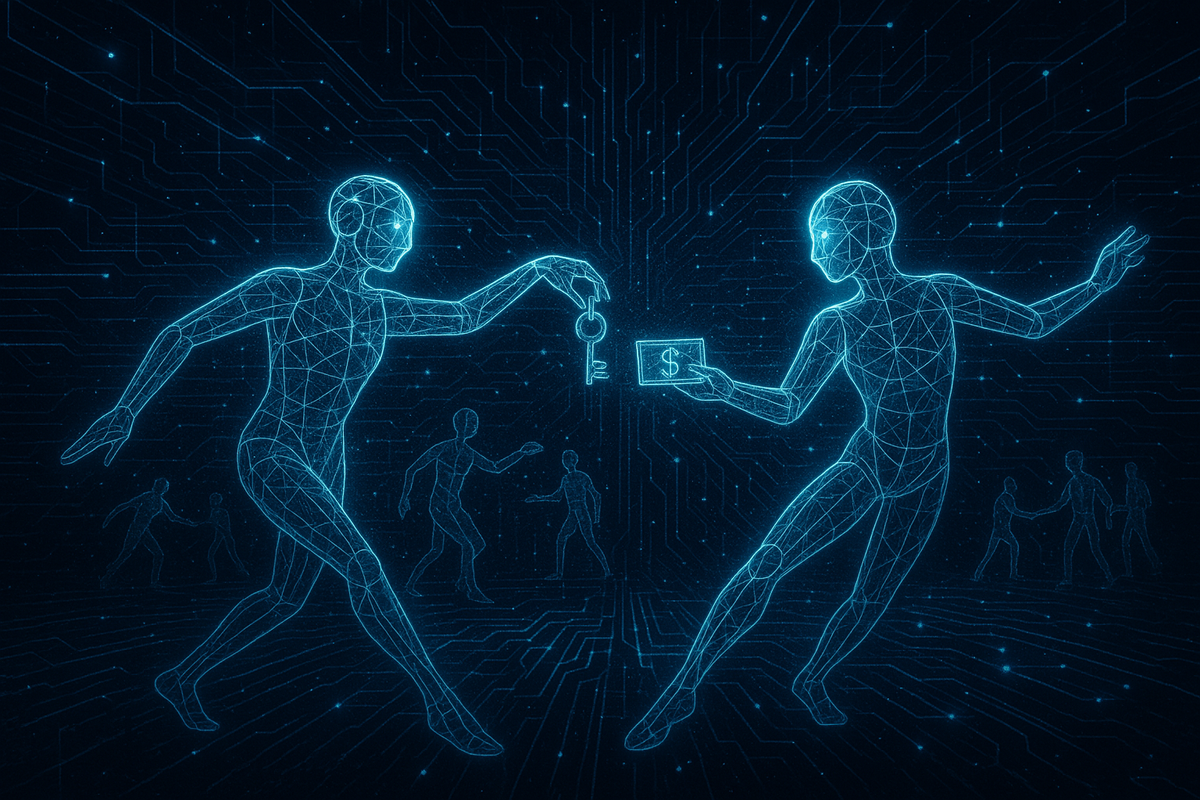Finally, a way for AI Agents to Dance Together

Up until today, AI has been growing by chaining together the results of model inferences, where each link in the chain was cooperative. Just like employees in a single company, all the AI models are working together to solve a given problem. I'll call the relationship between the models subservient to the singular problem.
In the real world, when employees of a company, or assistants of a person interact with employees or assistants of another person, the relationship is almost always adversarial. For example, a company employee wants to sell me something and charge full price, and I'm reluctant to buy and if I do, I want a discount.
For the new Agentic AI ecosystem to thrive, agentics will need to learn to dance together
In the near future, we will all have personal AI agents representing us in every imaginable way, and businesses will be represented by AI agents trying to sell more of every service and product they produce. Our agents will be swimming in a sea of adversarial interactions - peer-to-peer - and they will need protocols to:
- Discover each other
- Authenticate who they represent
- Communicate securely
While building a new version of my business and social networking app Matchwise, I recognized how disruptive peer-to-peer Agentic AI will be and the need for the aforementioned protocols. While I could have built closed-source libraries and tried to evolve a walled garden, it seemed to me much better to advocate an open and decentralized system for everyone - a rising tide lifts all boats.
Using Matchwise as a reference app to test these ideas, I have launched the first set of decentralized services to validate the architecture and give people a taste of what it can do.

These services are nascent and should be considered pre-beta, but you are welcome to try them out. Here's a quick overview:
- Decentralized Identifiers (DIDs) resolve to DID Documents (Agentic Profiles) which are hosted at services such as https://iamagentic.ai (for Matchwise Agentic Profiles) and https://test.p2pagentic.ai for developers to publish test Agentic Profiles. The architecture is decentralized, so anyone can host Agentic Profiles on any website or other DID method (e.g. Etherium)
- Agentic Profiles (as DID Documents) list the available AI agents for each person or company, along with the ways to authenticate communication. By default the Agentic Profile uses Json Web Tokens (JWT).
- The Matchwise service provides a webapp for demonstration. This webapp simply shares a users location to a presence service (using the Agentic Profile authorization protocol) and the presence service shares which people or businesses are nearby using DIDs. Just like there are many credit reporting services, there will be many presence services in the future and the crowd will decide which is "best"
- The Matchwise service responds to the presence service notifications of nearby people (shared as DIDs) and starts adversarial chats between the agents of those people.
- The Matchwise app shows which agents are "gossiping" (chatting) and provides a way to peek into the conversation
- When an agent determines the real people should meet, they signal the webapp which alerts the person.
The libraries are open source and available from NPM, and I'm wrapping them under the "Agentic Profile" name. Just like webpages were the go-to place for people, Agentic Profiles will become the way companies and people make their agents known to everyone.
- Agentic Profile Node/Express Demo - A library that demonstrates a Node service that hosts agentic chats and uses the Agentic Profile authorization protocol
- Agentic Profile Authentication Library - The core authentication library as an Node package. Leverages JWT, elliptic curves, DIDs and DID documents which results in a very small and easy to audit library.
There are four more Node packages available through NPM along with two more Github repositories which are linked from the above. Please reach out with any questions.